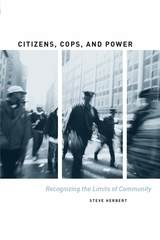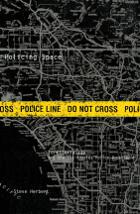2 books by Herbert, Steve

Citizens, Cops, and Power
Recognizing the Limits of Community
Steve Herbert
University of Chicago Press, 2006
Politicians, citizens, and police agencies have long embraced community policing, hoping to reduce crime and disorder by strengthening the ties between urban residents and the officers entrusted with their protection.
That strategy seems to make sense, but in Citizens, Cops, and Power, Steve Herbert reveals the reasons why it rarely, if ever, works. Drawing on data he collected in diverse Seattle neighborhoods from interviews with residents, observation of police officers, and attendance at community-police meetings, Herbert identifies the many obstacles that make effective collaboration between city dwellers and the police so unlikely to succeed. At the same time, he shows that residents’ pragmatic ideas about the role of community differ dramatically from those held by social theorists.
Surprising and provocative, Citizens, Cops, and Power provides a critical perspective not only on the future of community policing, but on the nature of state-society relations as well.
That strategy seems to make sense, but in Citizens, Cops, and Power, Steve Herbert reveals the reasons why it rarely, if ever, works. Drawing on data he collected in diverse Seattle neighborhoods from interviews with residents, observation of police officers, and attendance at community-police meetings, Herbert identifies the many obstacles that make effective collaboration between city dwellers and the police so unlikely to succeed. At the same time, he shows that residents’ pragmatic ideas about the role of community differ dramatically from those held by social theorists.
Surprising and provocative, Citizens, Cops, and Power provides a critical perspective not only on the future of community policing, but on the nature of state-society relations as well.
[more]

Policing Space
Territoriality and the Los Angeles Police Department
Steve Herbert
University of Minnesota Press, 1996
Policing Space is a fascinating firsthand account of how the Los Angeles Police Department attempts to control its vast, heterogeneous territory. As such, the book offers a rare, ground-level look at the relationship between the control of space and the exercise of power.
Author Steve Herbert spent eight months observing one patrol division of the LAPD on the job. A compelling story in itself, his fieldwork with the officers in the Wilshire Division affords readers a close view of the complex factors at play in how the police define and control territory, how they make and mark space.
A remarkable ethnography of a powerful police department, underscored throughout with telling on-the-scene vignettes, this book is also an unusually intensive analysis of the exercise of territorial power--and of territoriality as a key component of police power. Unique in its application of fieldwork and theory to this complex subject, it should prove valuable to readers in urban and political geography, urban and political sociology, and criminology, as well as those who wonder about the workings of the LAPD.
"Gives us the kind of fly-on-the-wall, first person observations that journalists dream of and readers find enthralling. Let's hope the members of the police commission give it a read while they fight the battle Willie Williams lost to reform a department that still very much belongs to Parker and Gates." --LA Weekly Literary Supplement
"This book is not a rehash of the time-worn cliches about the LAPD. It is a highly imaginative discussion of the meaning of territoriality in determining how police respond to citizens, to each other, and to their command structure based on space and its relationship to the exercise of power." --Law Enforcement News
"This is a fascinating book; well written cogently argued, chock-full of insights about police behavior, and an all-around good read." --Policing: An International Journal of Police Strategies and Management
"A fine book and a good read." --Contemporary Sociology
"Excellent book. A vivid and compelling analysis of the territoriality of routine police work on the streets of LA. The central argument is as clear as the message on the police tape, namely that territorial action os a fundamental component of everyday police behavior; and it is as authoritative, for it is built upon an intensive period of participant observation with LA cops. There is no doubt that this book is a major interdisciplinary contribution." --Environment and Planning D Society & Space
"Is a creative, engaging analysis expressed in a clear theoretical and conceptual framework. Herbert is able to vivdly demonstrate the importance of spatial context to an understanding of social action. With geographic perspectives rapidly growing in importance in policing, this unique contribution is particularly welcome." --Professional Geographer
"This book should be widely read, given the current ascendance of law and order culture and increasing demands for the policing of space." --Environment and Planning A
Contents
Territoriality and the Police
The Setting and the Research
The Law and Police Territoriality
The Bureaucratic Ordering of Police Territoriality
Adventure/Machismo and the Attempted Conquest of Space
Safety and Police Territoriality
Competence in Police Territoriality
The Morality of Police Territoriality
Making and Marking Space with the LAPD
Steve Herbert teaches criminal justice and geography at Indiana University.
[more]
READERS
Browse our collection.
PUBLISHERS
See BiblioVault's publisher services.
STUDENT SERVICES
Files for college accessibility offices.
UChicago Accessibility Resources
home | accessibility | search | about | contact us
BiblioVault ® 2001 - 2024
The University of Chicago Press









